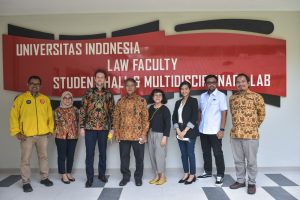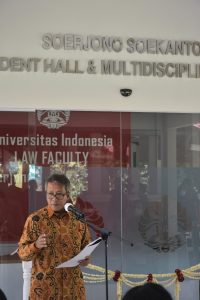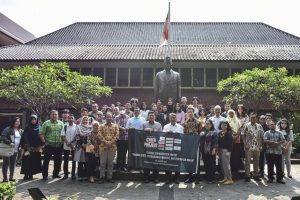
The Faculty of Law (FH), Faculty of Computer Sciences (Fasilkom), and the Department of Criminology, Faculty of Social and Political Sciences (FISIP), are currently working on a self-styled Cyber Project. This collaborative initiative, initiated in January 2020, aims towards a multidisciplinary approach to cyber security and defence. Despite running into obstacles faced by Covid-19, the project has been successful in fulfilling its targetted outcomes.
UI’s Cyber Project has bore three important fruits. The first among them is a new postgraduate Faculty of Law course titled “Cyber Security and Defence”. The materials of the course was designed with a multidisciplinary approach in mind and was tested for three days before the official closing of the Cyber Project on Friday (25/3) in Law Faculty Student Hall. The trial class was attended by 28 participants, comprised of students, lecturers, advocates, members of the police, and representatives from government agencies.
Secondly, the Cyber Project has resulted in a Multidisciplinary Laboratory, the first laboratory in a Faculty of Law in Indonesia to be equipped with digital forensics facilities. The class is also equipped with online and offline learning facilities, containing video materials and online software for online examinations and cyber incident reporting exercises.
The final result the Cyber Project has bore is co-operation between stakeholders coming from various disciplinary backgrounds. “Finding common understanding from differing scientific disciplines has proven a stark challenge. Cyber Project has given us the opportunity to practice mutual respect and collaborate in blending differing skills and experience to solve problems and challenges,” Parulian Paidi Aritonang S.H., LL.M., MPP, Vice Dean for Resources, Venture, and General Administration, Faculty of Law, stated.

The Dean of the Faculty of Law, Dr. Edmon Makarim, stated that the Cyber Project has encouraged multidisciplinary collaboration on local, national, and bilateral scales in increasing the quality of cyber security and defence. On the national scale is the interaction between UI and colleagues from Pengelola Nama Domain Internet Indonesia (PANDI), an organisation which manages Internet domain names in Indonesia, CyberArmy, and the Association of Lecturers on Information and Communication Technology Law (ADHTIK) and “on the bilateral level, Cyber Project has allowed us to work together with an multidisciplinary team from Vrije University [sic] Amsterdam,” Dr. Edmon said while inaugurating the new Student Hall & Multidisciplinary Lab.
The Cyber Project has been the subject of a discussion held during a visit of the King and Queen of the Netherlands HM Willem-Alexander dan HM Maxima on the 11th of March 2020 in Yogyakarta, as related by Dr. Edmon. “So I asked for Mr. Mark’s help, please inform both of them [the King and Queen of the Netherlands] that the Cyber Project that we presented a time ago has been succesfully completed. There is a inscription in FHUI that commemorates the contribution of the Government of the Kingdom of the Netherlands towards the advancement of multidisciplinary education on cyber security and defence in Indonesia.”

The “Mr. Mark” referred to by Dr. Edmon is none other than Mark Hengstman, First Secretary of Political Affairs from the Embassy of the Kingdom of the Netherlands in Jakarta, who was also present on the occassion. He bode UI and Indonesia’s Cyber Project well, and wished for collaboration on other occassions, including in the establishment of the Indonesia-Netherlands Multidisciplinary Center on Cyber Development. The inauguration of the Multidisciplinary Laboratory was followed by two webinars titled, in succession, “Cyber Security and Building Human Resources” and “Cyber Security and Multidisciplinary Collaboration on Law Enforcement”.
During the webinars, the Director of Cyber and Crypto Security (Human Development Sector), National Cyber and Crypto Agency, Giyanto Awan Sularso, stated that one of the keys to cyber security is quality human resources. Alongside national, bilateral, and international collaboration, cyber security also involves expanding partner networks.
Meanwhile, Samuel Abrijani Pangerapan, the Director-General of Informatics, Ministry of Communication and Informatics (Kemenkominfo), stressed the importance of expanding knowledge and outlook in the strengthening of defenses against third-party attackers in the second session of the webinar. “We need to strengthen our digital space by developing technology geared towards preventing data leaks, which may be caused from within.”
Finally, Dr. Edmon, on behalf of UI and the Faculty of Law, expressed his gratitude of support and collaboration from all parties involved, without which the Cyber Project would not have gone as well as it had. He expressed his wishes that Indonesia may in the future handle various challenges in cyber security and defence more competently.



